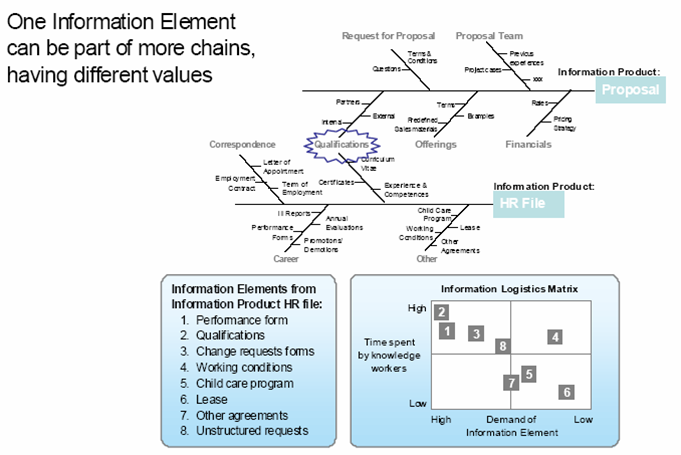Information logistics
This article contains wording that promotes the subject in a subjective manner without imparting real information. (February 2013) |
Information logistics (IL) deals with the flow of information between human and / or machine actors within or between any number of organizations that in turn form a value creating network (see, e.g.[1]). IL is closely related to information management, information operations and information technology.
Definition
- Information Logistics (IL) may be used in two ways. First it can be defined as "managing and controlling information handling processes optimally with respect to time (flow time and capacity), storage, distribution and presentation in such a way that it contributes to company results in concurrence with the costs of capturing (creation, searching, maintenance etc)." (Reference is missing!!!) Thus IL utilizes logistic principles to optimize information handling. Second IL can be seen as a concept using information technology to optimize logistics.
Goal
The goal of Information Logistics is to deliver the right product, consisting of the right information element, in the right format, at the right place at the right time for the right people at the right price and all of this is customer demand driven. If this goal is to be achieved, knowledge workers are best equipped with information for the task at hand for improved interaction with its customers and machines are enabled to respond automatically to meaningful information.
Methods for achieving the goal are:
- the analysis of information demand
- intelligent information storage
- the optimization of the flow of information
- securing technical and organizational flexibility
- integrated information and billing solutions [2]
The expression was formed by the Indian mathematician and librarian S. R. Ranganathan (Reference is missing!!!).
The supply of a product is part of the discipline Logistics. The purpose of this discipline is described as follows:
Logistics is the teachings of the plans and the effective and efficient run of supply. The contemporary logistics focuses on the organization, planning, control and implementation of the flow of goods, money, information and flow of people.
Information Logistics focusses on information. Information (from Latin informare: "shape, shapes, instruct") means in a general sense everything that adds knowledge and thus reduce ignorance or lack of precision. In stricter sense information becomes information only to those who can interpret it. Interpreting information will provide knowledge.
Information Element
An Information Element (IE) is an information component that is located in the organizational value chain. The combination of certain IEs leads to an information product (IP), which is any final product in the form of information that a person needs to have. When a higher number of different IEs are required, it often results in more planning problems in capacity and inherently leads to a non-delivery of the IP.
To illustrate the concept of an IP, an example is shown of a bottleneck analysis in HR (by J. Willems 2008). Here, the illustration shows how the information elements (e.g. qualifications) build up the information product (e.g. HR file).
See also
External links
- Bachelor program "Informationslogistik" at HFT Stuttgart
- Fraunhofer competence center for information logistics
- Nyenrode Information Logistics Weblog
- Informatielogistiek.nl heeft als doel dé online ontmoetingsplek te worden voor werknemers die inzichten, ervaringen en kennis zoeken of willen delen over informatielogistiek.
- www.OPTINI.com (OPT-IN Desktop and Browser based alert software)
- Adansys (Information Logistics Specialist)
Sources
- "IL quadrants for information access technology" by Olthof and Willems 2008
- "Information Logistics Research Report:Framework in the healthcare industry" by Willems, Willems and Hajdasinski 2009
- "From Having to Using" by Willems 2008 Information Logistics Working Paper Nyenrode
References
- ^ Hafter, D.; Kajtazi, M.: What is Information Logistics, 2009.
- ^ Uckelmann, D.: Quantifying the Value of RFID and the EPCglobal Architecture Framework in Logistics, Springer, Berlin 2012.

